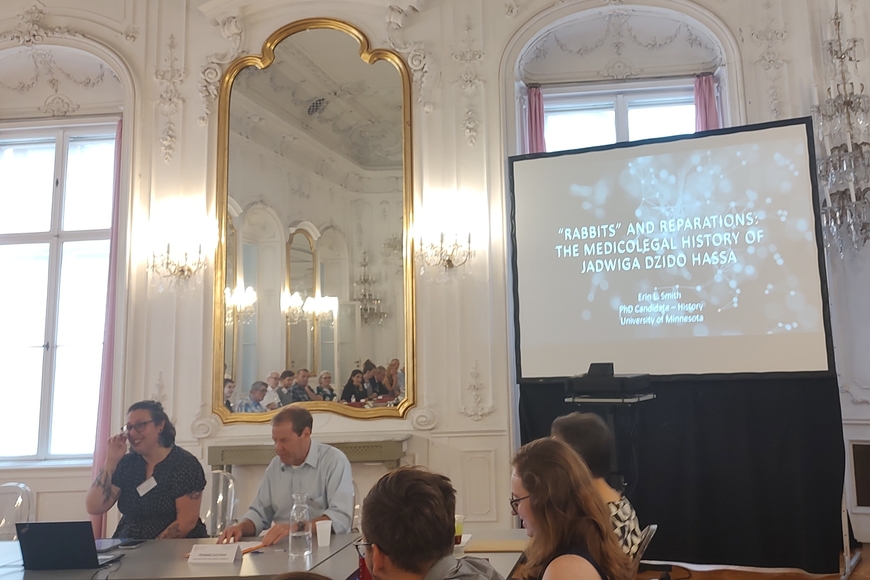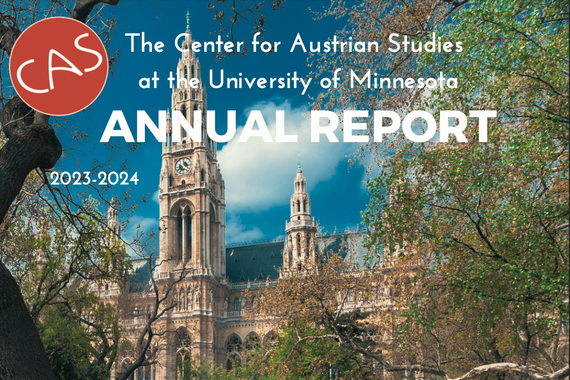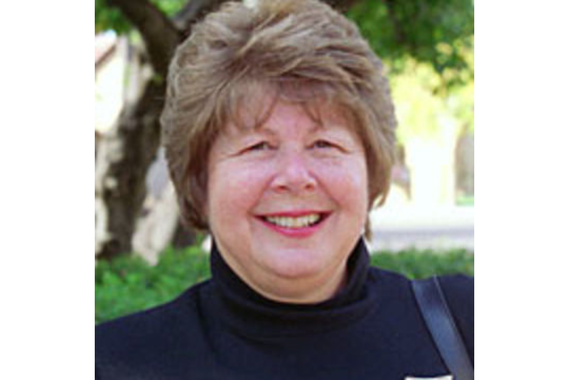CAS Participates in Austrian Studies Centres Conference in Budapest
The UMN Center for Austrian Studies participated in the annual Austrian Studies Centres conference, held at the Andrássy University in Budapest in 2024, and funded by the OeAD (Austria's Agency for Education and Internationalisation).
In addition to the annual conference, the OeAD also funds various exchanges, including the Marietta Blau (formerly BMBWF) Grants, which allow for a PhD candidate from a participating Austrian Studies Center to spend one year in residence at the University of Minnesota.
In attendance at this year's conference from the University of Minnesota were Howard Louthan (CAS Director and Professor of History), Emily Groepper (PhD, 2023), and Erin Smith (PhD Candidate, Department of History).
More about this year's participants:
Emily Groepper received her Ph.D. in Medieval Germanic Studies at the
University of Minnesota Twin Cities in July 2022 with a dissertation entitled The
Intentional Curation of Short Verse Narratives in a Compilation Manuscript for a Medieval
Audience. She currently serves as a Lecturer and First-Year German Language
Coordinator at the University of Minnesota. Her research interests include
language pedagogy, the history of emotions, and the afterlife of classical Latin
literature in the Middle Ages.
Erin L Smith is a PhD candidate in History at the University of Minnesota Twin
Cities. Prior to pursuing her doctorate, she taught global and American history at
the secondary education level. She studies the intersection of youth, gender, and
memory in European feature films of the Cold War era. Since beginning her
graduate work, she has also presented and/or published on the memorialization of
World War II Japanese American concentration camps and on the representation
of the Holocaust, genocide survivors, and second-generation descendants of
survivors in Marvel comics and films.
Center Austria New Orleans/University of New Orleans
Founded in 1997, the Center in New Orleans promotes studies on Austria and Europe in America’s Gulf region through fellowships, lectures and symposia. The Center is supported by the Austrian Marshall Plan Foundation and thus also contributes to keeping the memory of the Marshall Plan alive.
Wirth Institute for Austrian and Central European Studies/University of Alberta/Edmonton
The Wirth Institute for Austrian and Central European Studies is the only university institution in Canada dedicated exclusively to the interdisciplinary analysis of Central Europe. Founded in 1998, the Institute acts as an academic and cultural centre that organises lectures, academic conferences, art festivals, symposia, concerts and exhibitions on a regular basis.
Foundation for Austrian Studies Leiden/Leiden University
Since 1988 the ‘Stichting Oostenrijkse Studiën’ has been disseminating knowledge about Austria and Central Europe in the Netherlands and stimulating academic exchange. In close cooperation with Leiden University the foundation established a chair specialised in Austrian and Central European Studies. The history institute, the ‘Central and East European Studies Centre (CEES)’, founded in 2016, is a joint initiative with the Leiden Institute of Political Science and the Institute of Public Administration.
Centre for Austrian Studies Olomouc/University of Olomouc
The Centre for Austrian Studies Olomouc was founded in 2013. The scientific focus is on the Research Centre for German-Moravian Literature – established at Olomouc Palacky University since 1997 – ’s research which deals with German-Moravian literature as a genuine component of the Austrian literary and cultural tradition.
Central Europe Centre Budapest/Andrassy University Budapest
The Central Europe Centre at Andrássy University Budapest (AUB) was founded in 2010 and focuses its research and teaching on the history and culture of the Habsburg monarchy and its successor countries. It sees itself as an interdisciplinary, German-language platform for scholars to meet and discuss.
Center for Austrian Studies/Hebrew University of Jerusalem
The Center for Austrian Studies, founded in 2001 through a joint initiative of the Austrian Foreign Ministry, the Austrian Federal Ministry of Education, Science and Culture and the Friends of the Hebrew University of Jerusalem in Austria, promotes Austrian studies and knowledge about Austrian culture in Israel in the humanities, social sciences and law, supports relations between Israeli and Austrian academics and students, focuses on the history of the city of Vienna and its significance within European history, the heritage of the Jewish population in the Habsburg Monarchy and its contribution to European culture.
Institute of European Studies – Programme for the Study of Austria Berkeley/Berkeley University
The Austrian Studies programme at the University of California, Berkeley was established in 2017 as part of the Institute of European Studies (IES), the leading centre for the study of European affairs and the EU. Historical research and teaching emphasise the role of the multinational Habsburg monarchy in Europe, especially the legacy of transnational administration and its exemplary impact for today.
Austrian and Central European Center Vienna/University of Vienna, Institute of East European History
The Viennese Austrian and Central European Center has been located at the University of Vienna’s Department for Eastern European History since 2007. The Viennese Centre’s most important tasks include supporting excellent doctoral students, the publication of the annual conference proceedings (resulting from the Centres’ annual conventions), bringing the altogether nine Centres for Austrian Studies operating on three continents in touch with each other, and carrying out joint projects and international symposia.



